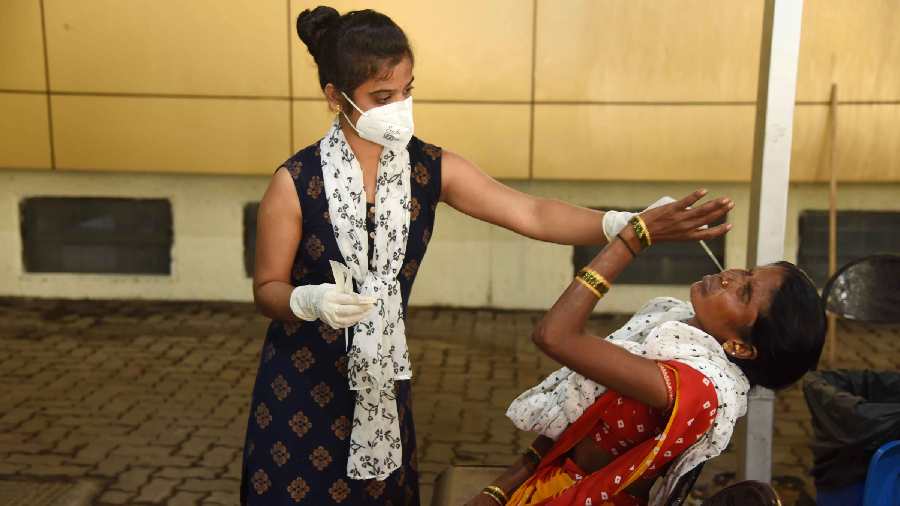A mini fourth wave of Covid-19 is sweeping the country, but experts say the chances of serious infections that require hospitalisation are likely to stay low. That’s because a huge chunk of the population has acquired immunity either by vaccination or having caught the virus, or both.
The government’s sero-surveys show that almost 80 per cent of Indians were already infected by January 2022 when Omicron variant spread at high speed throughout India. Also, almost 90 per cent of the adult population had already been vaccinated by then.
“The intersection of neither vaccinated nor infected was so small in India that we didn’t have as much of a problem as the rest of the world,” says Anurag Agrawal, who’s dean of biosciences and health research at Ashoka University. Agrawal was, until recently, director of the CSIR Institute of Genomics and Integrative Biology in Delhi.
On a similar note, virologist Shahid Jameel says: “A combination of infection and vaccination raises robust immunity, which will continue to protect from severe disease.”
Agrawal reckons that India possibly has the highest population immunity in the world and that the “vulnerable population neither infected nor vaccinated is not more than 3 per cent-to-4 per cent.” In Delhi, for instance, 97 per cent of the city’s inhabitants tested positive for antibodies during the sixth sero-survey conducted last September.
Because of this, Agrawal says: “No matter how many variants come, short of one that’s completely different with much greater virulence, India will do fine.”
By contrast, in countries like the US, vaccination resistance is high and around 25-30 per cent of the population refuses to take the vaccines. Similarly, in the UK and other European countries, 15-20 per cent of the population is still unvaccinated. Says Agrawal: “One good thing in India is that we had very few people who refused to get vaccinated.
90% Indians vaccinated
India has passed a major milestone in administering two doses of vaccine to 90 per cent of its adult population, Health Minister Mansukh Mandaviya said Monday.
Also, seropositivity levels were around 41 per cent in the US and about 40 per cent at a time when India had touched 90 per cent.
In Hong Kong, hospitalisations were high and the city was very badly affected by the Omicron variant because very few people had had the infection earlier and also the rates of vaccination were very low. Only 66 per cent of the people over 80 had been vaccinated when Omicron struck.
India logged 16,135 fresh infections in 24 hours Monday, according to Health Ministry data. But we don’t have a clear fix on the number of people infected in this latest spike because many people are doing home-testing using rapid-antigen kits.
Only a small number are doing RT-PCR tests which are automatically reported to the government. Secondly, in many cases in the current bout of Covid-19, the symptoms are so mild or even asymptomatic that some people are not bothering to test or quarantine. Many are continuing with their daily life and, thus, spreading infections far and wide.
Not the last Covid wave
And this isn’t the last coronavirus wave, doctors say. Covid-19 is likely to keep coming in waves over the coming months and possibly even longer. Still, Agrawal believes India will ride through such situations.
“The variants will keep coming. We will keep getting bumps like the one that we’re having. But the public health system in India will not be under any threat anytime soon, simply because almost everybody is previously infected and almost everybody among the high-risk population is vaccinated,” Agrawal said. “And hybrid immunity will make sure that severe disease remains very uncommon in times to come.”
“Unless the virus changes enormously, people will be able to fight it off before it becomes a major pneumonia. It does not mean that symptoms will not be there. It does not mean the fever will be light. It is simply a problem of pneumonia that gets you to hospitals and drops your oxygen and that will be unlikely,” Jameel says.
Longevity of antibodies
Jameel adds a cautionary note, though, saying that we still don’t really know how long the antibodies both from prior illness or vaccinations protect people from Covid-19.
“Protection from reinfection depends on the longevity of antibodies, which in Covid-19 have been shown to vary with time and the vaccine used,” he says.
And experts stress that it’s important to keep testing and also keep up genome sequencing. However, one problem with this is that fewer people are doing RT-PCR tests so that means the number of samples available for good-quality sequencing is also low.
Fear of dramatic mutation
One fear is that the virus might mutate dramatically in which case all bets are off. But most experts believe this is unlikely. Says Jameel: “The virus is unlikely to change so much as to begin causing serious disease in those who are vaccinated or have hybrid immunity.”
However, he warns: “It can cause pronounced disease in vaccinated people with comorbidities. India has a very large number of people with diabetes and cancer and cardiovascular disease is on the rise. That is an area of concern – not the daily increase or decrease in infection numbers.”
Omicron sub-variant BA.4 and BA.5 are already circulating in India and now another variant, BA 2.75, has reportedly been found in at least 10 states in India. The variant has also been detected in Canada, Australia, New Zealand, the UK and other countries.
Medical experts are watching the rise of the newest Omicron variant BA2.75 with concern. Jameel reckons this highly infectious Omicron descendant could cause a greater number of reinfections. But he says there is no evidence so far that it causes more severe disease than earlier forms of the illness did.
Get your boosters
One thing that people must do, doctors say, is get their booster shots as a precautionary measure. Even if the Covid cases are mild, it reduces chances of hospitalisation.
Unfortunately, the take-up of booster shots has been extremely low among Indians. The country has administered booster shots to just 15 per cent of those aged 60 and above and less than one per cent of the population between 18 and 59.
And a number of doctors are also saying that the government should update its policy to allow mixing of vaccines for booster shots. For instance, a study by Christian Medical College in Vellore indicates that following up two jabs of Covaxin with Covishield induces a far better immune response. But the government is still insisting on three doses of Covaxin.
Why boosters are key
Booster shots are important as countries are likely to see Covid-19 waves every four-to-six months, the World Health Organization’s Soumya Swaminathan says. Swaminathan the WHO chief scientist says boosters are key to enhancing waning immunity and creating strong long-lasting protection.
Also, people should keep wearing masks in confined, crowded places and ventilation of indoor spaces remain key as the Omicron subvariants are even more transmissible than the fast-spreading Omicron variant.












